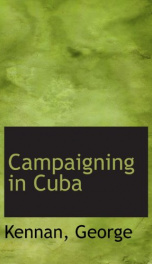campaigning in cuba

Purchase of this book includes free trial access to www.million-books.com where you can read more than a million books for free. This is an OCR edition with typos. Excerpt from book: CHAPTER III ON THE EDGE OF WAR UNTIL the illuminating search-light of war was turned upon the island of Key West, it was, to the people of the North generally, little more than a name attached to a small, arid coral reef lying on the verge of the Gulf Stream off the southern extremity of Florida. Few people knew anything definitely about it, and to nine readers out of ten its name suggested nothing more interesting or attractive than Cuban filibusters, sponges, and cigars. In less than a month, however, after the outbreak of hostilities, it had become the headquarters, as well as the chief coaling-station, of two powerful fleets; the news-distributing center for the whole Cuban coast; the supply-depot to which perhaps a hundred vessels resorted for water, food, and ammunition; the home station of all the newspaper despatch-boats cruising in West Indian waters; the temporary headquarters of more than a hundred newspaper correspondents and reporters, and the most advanced outpost of the United States on the edge of war. In view of the importance which the place had at that time, as well as the importance which it must continue to have, as our naval base in Cuban waters, a description of it may not be wholly without interest. The island on which the city of Key West stands forms one of the links in a long, curving chain of shoals, reefs, andkeys extending in a southwesterly direction about a hundred miles from the extreme end of the peninsula of Florida. It is approximately six miles long, has an average width of one mile, and resembles a little in shape a huge comma, with the city of Key West for its head and a diminishing curve of low, swampy chaparral and mangrove-bushes for a tail. The shallow bay of pale-green water between the head and the tail on the concave side of the...
Info about the book
Author:
Series:
Unknown
ISBN:
1176241397
Rating:
3.5/5 (4)Your rating:
0/5
Languge:
English
Users who have this book
Users who want this book
What readers are saying
What do you think? Write your own comment on this book!
write a commentif you like campaigning in cuba try:
Do you want to read a book that interests you? It’s EASY!
Create an account and send a request for reading to other users on the Webpage of the book!






